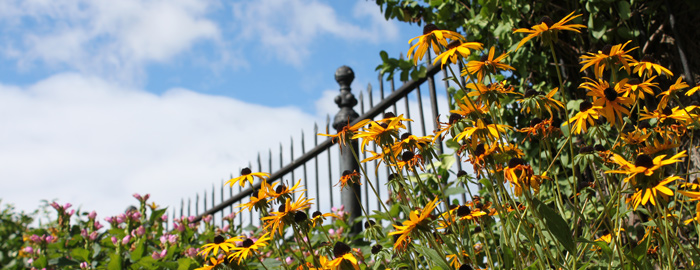An Understanding of Flower Gardens
 Huddled in a cubicle at the National Library of Canada, I read, page by page, through thirty years of Western Producer archives. My research provided a unique glimpse into rural life, in some rather unexpected ways.
Huddled in a cubicle at the National Library of Canada, I read, page by page, through thirty years of Western Producer archives. My research provided a unique glimpse into rural life, in some rather unexpected ways.
First published in 1924, the Producer is the largest and longest-running farm paper in Canada. Steeped in turn-of-the-century prairie populism, the Wheat Board found support in its pages, as did the Cooperative Commonwealth Federation, an organization that later became the New Democratic Party.
My particular focus was on the “Mainly for Women†pages. Edited by agrarian feminist and co-op organizer, Violet McNaughton, the two-page section was a forum where rural women could share their views. McNaughton set the tone from the very beginning: “Will you co-operate with me in using this page for discussion of efforts that we can make to attack our share of economic problems and important social ones too? Will you send in ideas and suggestions to ‘Our Letter Bag’?†(1925).
The resulting discussions ranged from women’s workload, to the Great Depression, to universal healthcare. One letter shared the best recipe for lye soap, while another talked about motherhood mortality. It was a mixed bag, making for rich social history.
The letters also resonated on a personal level. I was surprised by the aesthetics; and at times the writer’s experiences related strongly to my own. One of my earliest discoveries in this vein was titled “Towards an Understanding of Flower Gardens,†written by a woman recalling her mother’s workload:
“She had a love for little things, pretty things—forget-me-nots and crimson rambler roses. But it was a vegetable garden, and not flower beds where she hoed the weeds, in addition to a multitude of other duties.†(1928).
Having grown up on a farm in Southern Ontario, vegetable gardens always made good sense: you get out what you put in. But I never quite grasped my mother’s passion for growing flowers. That short passage helped me understand why it was so important: although my mother had a 'multitude of duties', her flower garden provided a much-needed reprieve.
Another letter, written in 1934 by the prolific ‘Jenny Pringle’, brought back memories of many flower-filled excursions:
“I’ve been starved for rain like I have been for trees. I just can’t get enough of the bush. I go for walks everyday-- it’s simply beautiful, like being in a great church or something. Wood violets are everywhere, roses are beginning to bloom, lady slippers in all the hollows and many other flowers I do not know…â€
Every spring, my great grandmother would lead my sister and me through the ravines in search of wildflowers. I remember the smell of rich earth, and the thrill we’d get when spying Jack-in-the-pulpits, Johnny jump-ups, trilliums, May apples, and lady slippers. My grandma would recite the names with reverence, teaching us as we walked along.
Some of the Producer writers shared a similar appreciation for their countryside:
“It was a lovely afternoon. I was taking lunch out to the men who were stacking hay. The sky was blue, and high up were a few white clouds like daubs of paint…the fallow lay bare and waiting in the sun. The leaves were turning colour and a choke cherry bush was a warm red. Is any country in the world more blessed then we on a day when the air is rare and clear and the scenery so bright?†(‘Mac’, 1943)
‘Mac’ reminded me of how my mother and I used to drive out to the fields to deliver coffee during harvest. The workers would sit on the tailgate, rest in the sunshine and take in the day. Even when I was old enough to be working long hours in the fields myself, I still valued the ‘rare and clear’ beauty of the back acres.
Lastly, one of the letters I related to the most remains anonymous. In my hurry to copy it down, I didn’t include the writer’s name and the date. Still, it resonates. Her words connected me to moments I’d experienced at home, and spoke to what sustained me when I moved to the city.
We were too busy earning dollars….trying to buy happiness out of the stores instead of just taking it out of the farm: the edge of a frosty morning, the smell of a barnyard on a warmish day at the end of winter when the sun bakes hot on the gray boards of the barns and fences, the smell of upturned earth, of the pasture after rain. The feel of twilight creeping up from the river like gray water…
I have missed a lot of happiness, but I am making up for it while there is still time. As I write this it is June and last night the supper dishes went unwashed. I had promised my six-year-old daughter to walk with her. We watched the fireflies light the larkspurs.
I think she will remember that in years to come. Maybe…when she goes out into the world and walks through crowded streets, she will not see the dirt and meanness of life. The winds of wheat will be all about her and with her she will carry the great silence of the prairie.â€
In all of this reading and research I chanced upon some surprising conclusions. I found a like-minded community in a very unlikely place and realized that rural life at the turn of the century was surprisingly similar to my own. Through the letters of women living nearly a century ago, I discovered a sense of shared heritage.
Photo credits: Mikael Lavogiez

